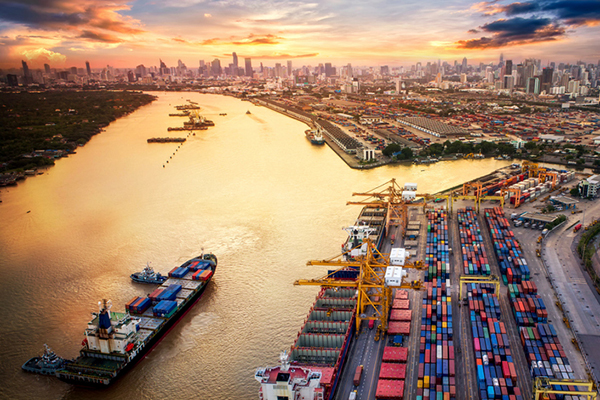When the Port of Los Angeles stages its annual “State of the Port” address on January 14, supply chain managers will be given more details on 2020 container throughput at the nation’s largest ocean cargo gateway, as well as what LA has determined as its 2021 priorities.
The virtual event – featuring the port’s executive director, Gene Seroka – will be co-hosted by the Pacific Merchant Shipping Association (PMSA), which has already shared its views on the state of West Coast ports in general in the current crisis.
“Due to the pandemic, the entire supply chain is experiencing unprecedented problems that have contributed to a delay in goods reaching retail operations and consumers,” says PMSA president, John McLaurin.
After cargo volumes crashed in the spring at the start of the pandemic, cargo volumes have now been squeezed into the last remaining months of 2020.
The pandemic surge has marine terminals taking extraordinary actions to keep cargo flowing.
“To do our part, marine terminals have opened additional gates to allow more trucks inside the terminal and increase throughput. Marine terminals have also increased hours of operation to allow trucking companies greater access at night and on the weekends. And terminals have leased land outside the ports to create more room to ease congestion on dockside terminals,” says McLauren.
He adds that espite the efforts by all sectors of the supply chain, the pandemic continues to dramatically impact on the goods movement system in California and nationally.
U.S. imports, normally spread throughout the year, have been packed into the second half of the year. Normally, the holiday supplies start arriving as early as July, but with the delayed ordering and offshore manufacturing, goods began arriving in higher numbers later in the season.
This shortened, concentrated resupply period, more than any other factor, has caused problems throughout the goods movement system.
“The pandemic also impacted the availability of critical workers throughout the supply chain, including those working at the ports, railroads, trucking companies, warehouses, and retail locations. Workers contracting the virus, mandatory quarantines and sanitizing equipment and work sites impacted the ability of system to respond to a record influx of goods,” says. McLaurin. “Missed appointments by trucking companies continue to sap capacity in the supply chain, reducing opportunities for cargo to move from terminals to warehouses. Railcar availability is also strained, which is contributing to the inability to clear out the older containers in a timely manner to make room for new containers sitting on the ships that are waiting to unload.
He concludes that the pandemic also created equipment problems as retail and warehouse locations are under limited operations leading to delays in returning needed chassis to the ports. Delays in returning chassis have doubled, resulting in, marine terminals unable to move containers out of terminals and make room for new containers.
“Relieving the congestion will require every part of the supply chain working together,” says McLaurin. “Cargo owners must expedite their ordering for pick-up of containers, warehouses and distribution centers must open to accept containers and quickly return equipment, and trucking and rail must increase their capacity to move containers out of the ports.”
Editor’s Note: The virtual event is free-of-charge and available online to those who register. Click tickets and select general admission to register. After registering, you will immediately receive a confirmation email. A link to watch the event online will be emailed the day before the scheduled event.
Free Registration Link: https://portofla.org/SOTPLA21reg
SC
MR


More Ports & Shipping
- Shining light on procurement’s dark purchases problem
- As Red Sea Crisis Drags On, Shippers Eye Alternatives
- Global Container Shipping Industry Sets Sights on Tech Investment, Capacity Concerns
- US Ports to Share $653M in Funding to Improve Throughput, Reduce Emissions
- The Astonishing Port of Laredo
- Navigating the Panama Canal Drought: Tips to Get Your Shipments Moving
- More Ports & Shipping
Latest Podcast

 Explore
Explore
Topics
Procurement & Sourcing News
- Bridging the ESG gap in supply chain management: From ambition to action
- Israel, Ukraine aid package to increase pressure on aerospace and defense supply chains
- How CPG brands can deliver on supplier diversity promises
- How S&OP provides the answer to in-demand products
- There is still work to do to achieve supply chain stability
- Blooming success: The vital role of S&OE in nurturing global supply chains
- More Procurement & Sourcing
Latest Procurement & Sourcing Resources

Subscribe

Supply Chain Management Review delivers the best industry content.

Editors’ Picks





